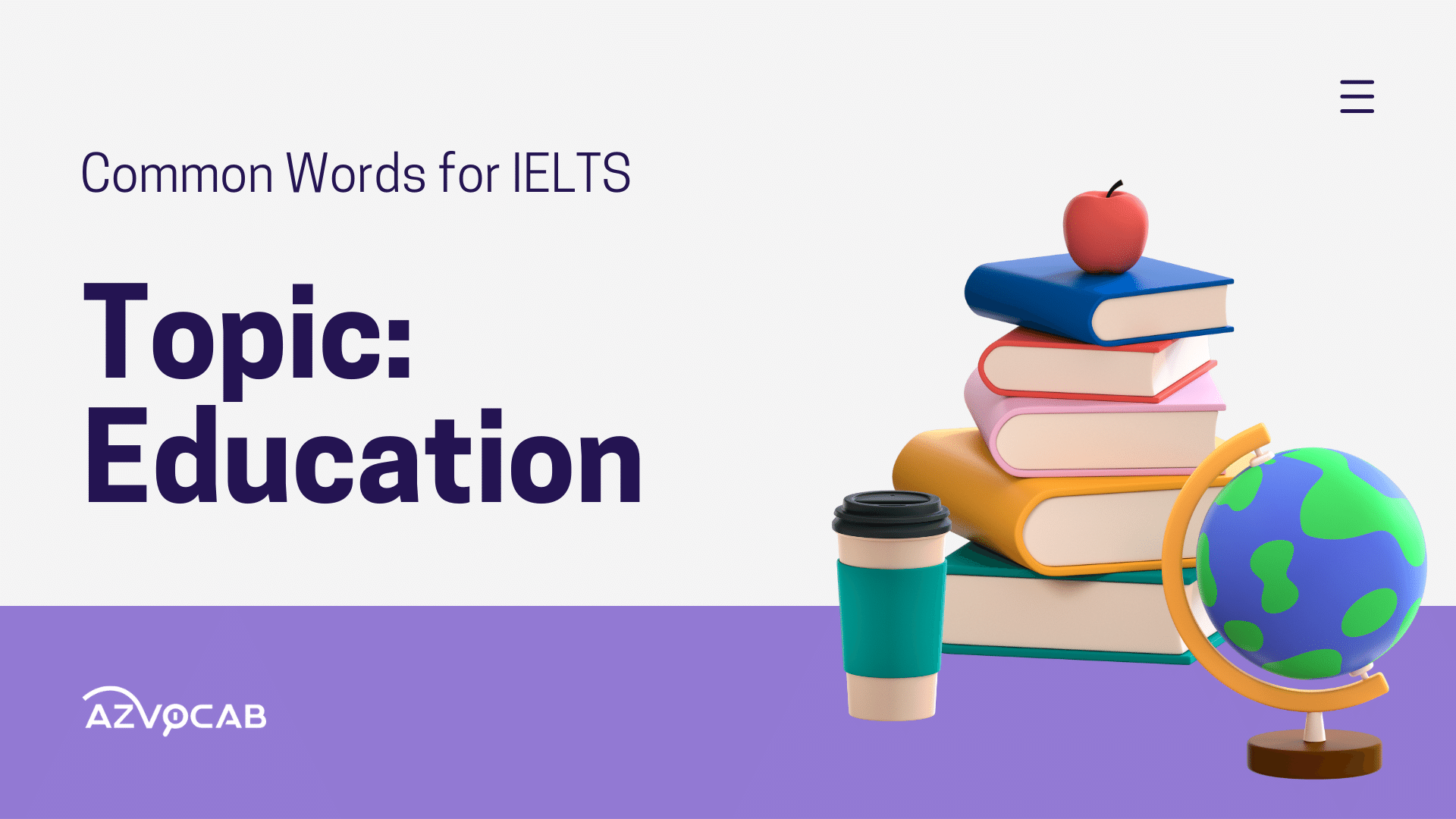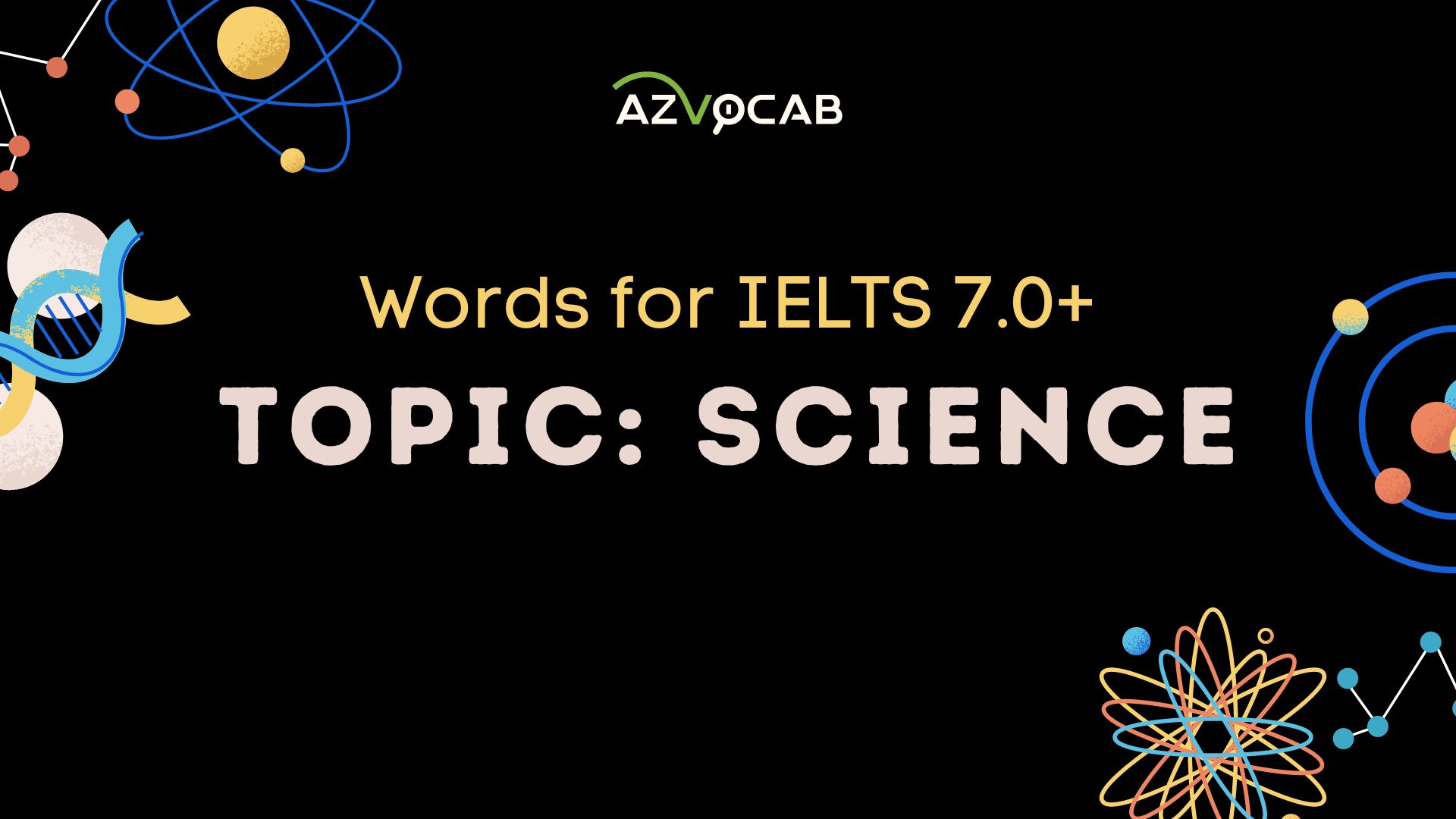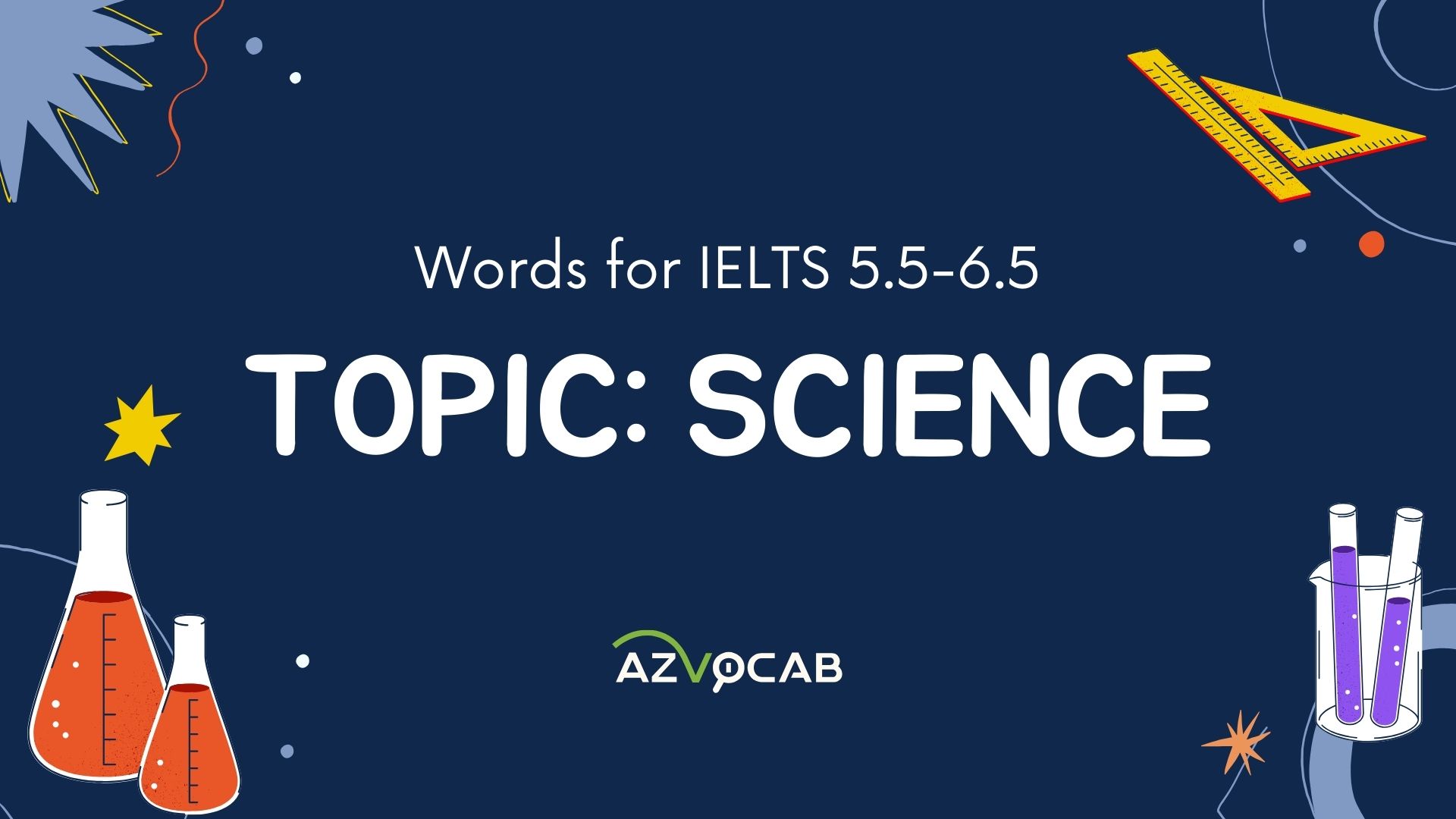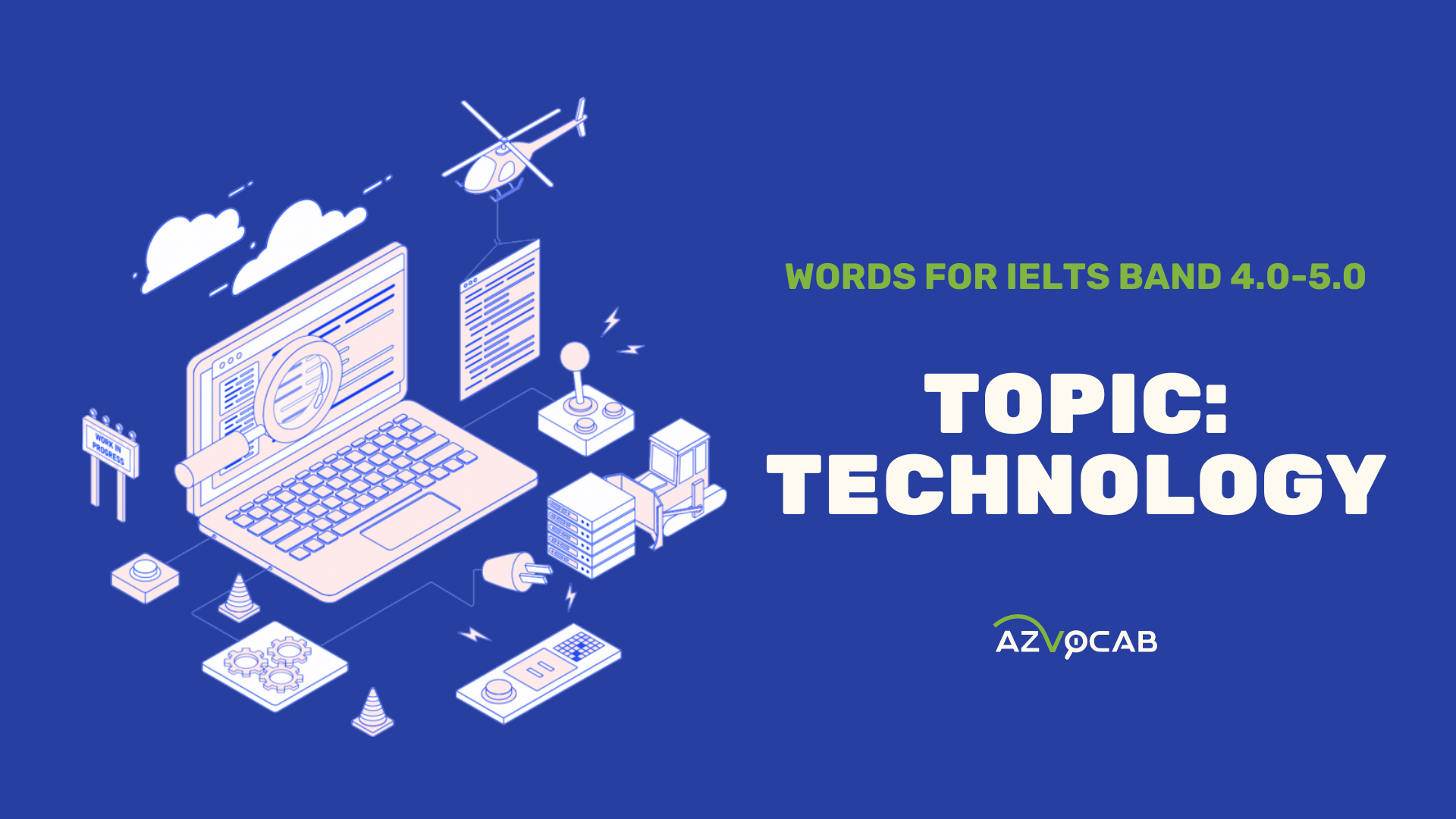azVocab has compiled over 90 common words on the topic of “Education” for the IELTS exam. These vocabulary words can be used in all four sections of four skills: Reading, Listening, Speaking, and Writing. azVocab has carefully selected examples that fit specific contexts in IELTS exams. This will help you understand how to use these words in context, increasing the effectiveness of your vocabulary learning.
1. Vocabulary related to teaching and learning in general
| education (n.) – the process of teaching or learning, especially in a school or college, or the knowledge that you get from this | All secondary and post-secondary school students in full-time education are eligible to apply for the program. |
| limit (n.) – the greatest amount, number, or level of something that is either possible or allowed | From the very beginning, it really is vital to set clear limits and to have a very fixed plan in terms of the scope of your research. |
| opportunity (n.) – an occasion or situation that makes it possible to do something that you want to do or have to do, or the possibility of doing something | Homeschooling magazines and websites give families the opportunity to read about others’ experiences and get ideas for different kinds of educational activities to try. |
| purpose (n.) – why you do something or why something exists | The purpose of this series of lectures is to help you to become a better student by making you more aware of the psychology behind the learning process. |
| scholarship (n.) – an amount of money given by a school, college, university, or other organization to pay for the studies of a person with great ability but little money | In many countries, governments give scholarships to students from low-income families, which enables poorer students to study at university. |
| self-discipline (n.) – the ability to make yourself do things you know you should do even when you do not want to | You need a lot of self-discipline when you’re doing research work on your own. |
| skill (n.) – an ability to do an activity or job well, especially because you have practised it | Our program is designed to offer employment opportunities for students that will enrich their academic studies and help them gain valuable work-related skills thereby improving their chances of finding a good job after graduation. |
| training (n.) – the process of learning the skills you need to do a particular job or activity | To prepare for a truly out-of-this-world experience, passengers will spend two days in our special training facility. |
| tutor (n.) – a teacher who teaches a child outside of school, especially in order to give the child extra help with a subject he or she finds difficult | Many people think that they’ll have to hire professional tutors for their children, but that isn’t required. |
| lecturer (n.) – someone who teaches at a college or university | You should revise your notes and make sure that you have a clear understanding of what your lecturers taught you. |
| distracting (adj.) – making it difficult for someone to give their attention to something | I know that some people find noise distracting, but I actually prefer to study in a noisy environment. |
| eligible (adj.) – having the necessary qualities or satisfying the necessary conditions | All secondary and post-secondary school students in full-time education are eligible to apply for the program. |
| relevant (adj.) – connected with what is happening or being discussed | All of the ideas presented in your essay must be relevant and supported by examples. |
| studious (adj.) – a studious person enjoys studying or spends a lot of time studying | Even the most studious among you will probably have difficulty studying at some stage in your academic career. |
| well-informed (adj.) – having a lot of knowledge or information about a particular subject or things in general | Getting well-informed feedback on your writing and speaking exam practice exercises would also be an advantage. |
| relatively (adv.) – in comparison with other similar things or with what you expect | People with a learning disorder such as dyslexia may need to work harder than others in their studies as they often struggle to read even relatively simple texts. |
| award (v.) – to give money or a prize following an official decision | Women hold only 14 percent of new patents awarded. |
| encourage (v.) – to talk or behave in a way that gives someone confidence to do something | The government should educate people about these problems and encourage us to change our habits. |
| ensure (v.) – to make something certain to happen | We could try to ensure that more jobs are created so that the divide between rich and poor is reduced. |
| evaluate (v.) – to judge or calculate the quality, importance, amount, or value of something | Can you evaluate the importance of compulsory state education? |
| hinder (v.) – to limit the ability of someone to do something, or to limit the development of something | Visual learners prefer to sit somewhere in the classroom where no obstructions hinder their view of the lesson. |
| present (v.) – to give, provide, or make something known | To open an account you need to present evidence that you are enrolled in a full-time course. |
| reform (v.) – to make an improvement, especially by changing a person’s behaviour or the structure of something | The education system must be radically reformed. |
| struggle (v.) – to experience difficulty and make a very great effort in order to do something | It is true that many students struggle to produce high-quality essays. |
2. Vocabulary related to educational levels
| further education (n.) – education below the level of a university degree for people who have left school | The musician participants were all further education students from two colleges, all of whom were studying popular music and music technology. |
| achievement (n.) – something very good and difficult that you have succeeded in doing | Individual case managers will determine the minimum level of academic achievement required for each job. |
| grade (n.) – hạng, loại, cấp bậc | She taught in the junior part of the school and she was actually my teacher in first grade but when I went up to the senior school. |
| graduation (n.) – a level of quality, size, importance, etc. | She managed to find a job immediately after graduation. |
| level (n.) – a position within a system in which people are arranged according to their importance | A student graduating from university with the highest level of qualifications, but limited practical skills still has a great deal to learn. |
| Master’s (n.) – a Master’s degree |
So you have graduated from university and decided to continue studying towards a Master‘s or PhD. |
| PhD (n.) – abbreviation for doctor of philosophy: the highest college or university degree, or someone who has this | Giselle Bastion has recently completed her PhD at Flinders University. |
| undergraduate (n.) – a student who is studying for their first degree at a college or university | The student council consists of ten undergraduates and four postgraduate students. |
| postgraduate (adj.) – used to refer to university studies or students at a more advanced level than a first degree | The following essay was originally written for a postgraduate unit, Art in Education 6, Curtin University, 1990. |
| senior (adj.) – high or higher in rank | She was actually my teacher in first grade but when I went up to the senior school, I didn’t see very much of her. |
| vocational (adj.) – (of an educational course or a qualification) providing knowledge and skills that prepare you for a particular job | Vocational or technical education was once considered to be a low-status choice for students. |
| well-informed (adj.) – having a lot of knowledge or information about a particular subject or things in general | Getting well-informed feedback on your writing and speaking exam practice exercises would also be an advantage. |
| gain (v.) – to get something that is useful, that gives you an advantage, or that is in some way positive, especially over a period of time | The internship program allows undergraduates to gain work experience. |
| graduate (v.) – to complete a first university degree successfully | I’ve always wanted a career in marketing, so I studied as a graphic designer and when I graduated, I got a job with a marketing company. |
3. Vocabulary related to educational programs in educational institutions
| program (n.) – a plan of activities to be done or things to be achieved | I think in some schools they have special programs for gifted children. |
| schedule (n.) – a list of planned activities or things to be done showing the times or dates when they are intended to happen or be done | Some homeschooling parents instruct their children for a set number of hours every day, whereas others follow a less structured schedule. |
| semester (n.) – one of the periods into which a year is divided at a college or university, especially in the US and Australia | This semester, we’re going to be looking at the modern aviation industry here in the USA. |
| assignment (n.) – a piece of work given to someone, typically as part of their studies or job | Students in the internship program are given an assignment related to their research area offering them the chance to use their academic knowledge in an actual work setting. |
| curriculum (n.) – the subjects studied in a school, college, etc. and what each subject includes | The practice of creating a separate, enriched curriculum for gifted students began in the early twentieth century. |
| dissertation (n.) – a long piece of writing on a particular subject, especially one that is done in order to receive a degree at college or university | One of the greatest difficulties faced by postgraduate students is choosing a topic to base their dissertation on. |
| exam (n.) – a test of a student’s knowledge or skill in a particular subject | I finished my exams yesterday, but I won’t get the results until August. |
| homework (n.) – work that teachers give their students to do at home | A teacher might obligate his students to spend several hours a day doing homework. |
| project (n.) – a study of a particular subject done over a period of time, especially by students | You should prepare homework or projects carefully, and also revise for exams. |
| research (n.) – a detailed study of a subject, especially in order to discover (new) information or reach a (new) understanding | There’s a lot of research and development going on into what kinds of products people want. |
| result (n.) – a good or pleasing effect | Many families are satisfied with the results they get from homeschooling and would never send their children back to a traditional school. |
| syllabus (n.) – (a plan showing) the subjects or books to be studied in a particular course, especially a course that leads to an exam | Externally created syllabuses and materials are viewed as tools that students and teachers use as they construct the enacted experience of the classroom. |
| task (n.) – a piece of work to be done, especially one done regularly, unwillingly, or with difficulty | Knowledge of academic language is intertwined with both the concepts taught in school and the cognitive processes required to carry out academic tasks. |
| textbook (n.) – a book that contains detailed information about a subject for people who are studying that subject | The theory of commodity demand was designed originally to study the consumer who appears today in elementary economics textbooks. |
| thesis (n.) – a long piece of writing on a particular subject, especially one that is done for a higher college or university degree | At some stage during the next few years, you will need to consider your thesis. |
| conduct (v.) – to organize and perform a particular activity | Over the past few years, we’ve been involved in conducting research on an area of the USA known as Lake Coeur D’Alene. |
| learn (v.) – to get knowledge or skill in a new subject or activity | I get to use the skills I learned at college in this job. |
| review (v.) – to study again something you have already learned, in preparation for an exam | You should also review your notes after each lesson at school. |
| revise (v.) – to study again something you have already learned, in preparation for an exam | Learn vocabulary in lists of 18 or 36 words and revise them before you learn the next set. |
4. Vocabulary related to fields of study and related concepts
| accounting (n.) – the skill or activity of keeping records of the money a person or organization earns and spends | I’m studying accounting at the moment at a very famous university in my country. |
| archaeology (n.) – the study of the buildings, graves, tools, and other objects that belonged to people who lived in the past, in order to learn about their culture and society | Daniel is very interested in history and archaeology and often visits historic sites. |
| conceptualization (n.) – the act or process of forming an idea or principle in your mind | This topic entails a different set of research questions, theoretical conceptualizations, and sources. |
| field (n.) – an area of activity or interest | Placement does not need to be related to a particular field of study and so participants may even discover areas of work they have never considered before. |
| geology (n.) – the study of the rocks and similar substances that make up the earth’s surface | Geology is the study of the structure and origin of the earth. |
| hypothesis (n.) – an idea or explanation for something that is based on known facts but has not yet been proved | Different hypotheses have been put forward to explain why these foods are more likely to cause problems. |
| inconsistency (n.) – the fact of containing some ideas, statements, arguments, etc. that do not agree with others, or something such as an idea, statement, or argument that has this quality | There is some inconsistency between the theory and the practice. |
| insignificance (n.) – the fact of being small or not noticeable, and therefore not considered important | The insignificance of the results in this group and the small sample size suggests that little weight should be given to the reversal. |
| interpretation (n.) – an explanation or opinion of what something means | Evidence from tools and weapons can lead to skewed interpretations of past life. |
| scope (n.) – the range of a subject covered by a book, programme, discussion, class, etc. | From the very beginning, it really is vital to set clear limits and to have a very fixed plan in terms of the scope of your research. |
| sociology (n.) – the study of the relationships between people living in groups, especially in industrial societies | Dan Taylor is a sociology professor at the University of North Carolina. |
| knowledge (n.) – understanding of or information about a subject that you get by experience or study, either known by one person or by people generally | On top of this, you also need to be sure that you have a broad knowledge of your area of specialisation. |
| theorist (n.) – someone who develops ideas about the explanation for events | Relief theorists, on the other hand, propose a ‘tension-release’ model to the problem of humour. |
| theory (n.) – a formal statement of the rules on which a subject of study is based or of ideas that are suggested to explain a fact or event or, more generally, an opinion or explanation | I prefer teachers who don’t put too much emphasis on learning and studying the theory of chemistry. |
| topic (n.) – a subject that is discussed, written about, or studied | Writing a thesis can be very daunting, but the task is much more straightforward if the topic you select is appropriate for you, |
| academic (adj.) – relating to schools, colleges, and universities, or connected with studying and thinking, not with practical skills | Even the most studious among you will probably have difficulty studying at some stage in your academic career. |
| analytical (adj.) – examining or liking to examine things in detail, in order to discover more about them | Numerous studies have shown that this thinking style is often highly analytical and can be very productive. |
| hypothetical (adj.) – imagined or suggested but not necessarily real or true | It is also important to emphasize that the utilities estimated for the hypothetical programs are not all statistically different. |
| non-academic (adj.) – not related to formal studying | Students at the school are strongly encouraged to take part in non-academic activities such as learning to play a musical instrument. |
| work-related (adj.) – connected with someone’s job or with paid work in general | Our program is designed to offer employment opportunities for students that will enrich their academic studies and help them gain valuable work-related skills thereby improving their chances of finding a good job after graduation. |
| analyse (v.) – to study or examine something in detail in order to discover or understand more about it | It can be even more helpful to analyse existing research and ask yourself if there are any controversies. |
5. Vocabulary related to schools and educational institutions
| campus (n.) – the buildings of a college or university and the land that surrounds them | In my second year, I helped set up the university radio station. It used to broadcast everything from campus news to local bands. |
| college (n.) – a university where you can study for an undergraduate (= first) degree | Community colleges are also now attracting more and more students who already have a degree but want to learn a skill or a trade that will help them earn better wages. |
| funding (n.) – money given by a government or organization for an event or activity | University funding was tremendously biased towards scientists. |
| grant (n.) – an amount of money given especially by the government to a person or organization for a special purpose | Local industries are willing to support students’ research by providing grants. |
| high school (n.) – a school in the US for older children, usually children from grades 9-12, or aged approximately 14-18 | Young children are often very creative, although many give up when they begin high school. |
| institution (n.) – a large and important organization, such as a university or bank | The academic institution plays an important role in the placement of students under this program and they will determine the duration of a work assignment. |
| kindergarten (n.) – a school for children between the ages of about two and five | I went to kindergarten from the age of four and I remember that I didn’t enjoy it very much at all. |
| library (n.) – a building, room, or organization that has a collection of books, documents, music, and sometimes things such as tools or artwork, for people to borrow, usually without payment | In previous years, the library was always very busy, but our current students seem to prefer to study in the privacy of their own room. |
| primary school (n.) – in the UK and other countries, a school for children between five and eleven years old | A problem with the schools in my country, especially the primary schools, is the size of the classes. |
| secondary school (n.) – a school for children between the ages of 11 and 18, approximately | As a secondary school pupil, I participated in regional and national debates around the country. |
| university (n.) – a place where people study for an undergraduate (= first) or postgraduate (= higher level) degree | First-year students often struggle with the transition from high school to university. |
| mixed (adj.) – including both sexes | I’m glad I didn’t go to a mixed school because I think there are fewer distractions so everyone can just concentrate on their studies. |
| single-sex (adj.) – for either girls or boys, but not both | I went to a single-sex school because my parents couldn’t afford to send me to a private school. |
| attract (v.) – (of people, things, places, etc.) to pull or draw someone or something towards them, by the qualities they have, especially good ones | Community colleges are also now attracting more and more students who already have a degree but want to learn a skill or a trade that will help them earn better wages. |
Here is common vocabulary related to the Education topic. We hope it will be a useful resource to help you succeed in mastering this topic in the IELTS exam. Keep following more vocabulary compilations on common topics for the IELTS exam by azVocab!
ielts
ielts vocabulary
2218
Share






